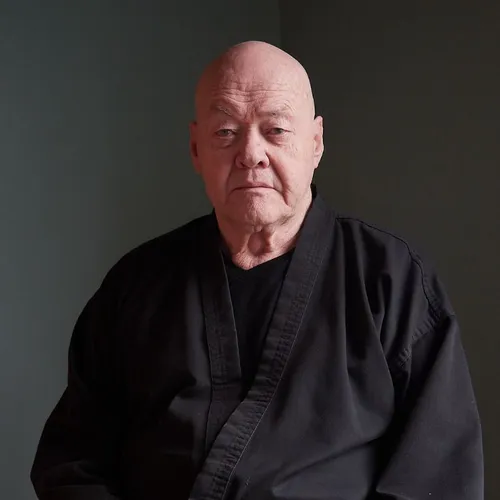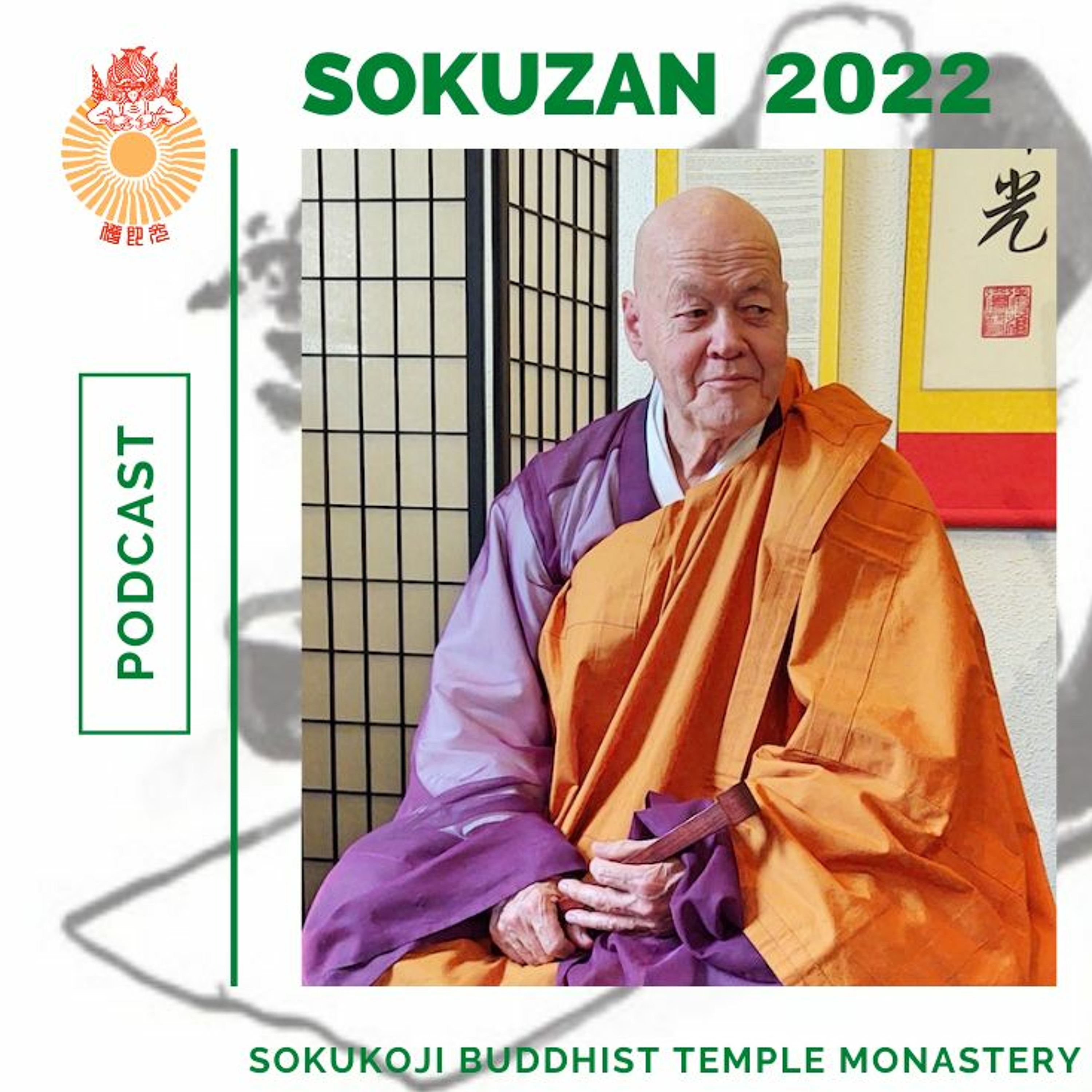
SokukoJi Buddhist Temple Monastery
Dharma talks by Sokuzan from SokukoJi Buddhist Temple in Battle Creek, Michigan.
- Update frequency
- every 3 days
- Average duration
- 62 minutes
- Episodes
- 510
- Years Active
- 2019 - 2025

Keep Sitting - 10-09-22 by Sokuzan - sokukoji.org
This is a direct instruction from the Vidyadhara, Chögyam Trungpa Rinpoche: keep sitting. If you’re looking at your mind and watching without objecting, agreeing, or shutting down you begin to see th…
01:01:04 |
Fri 07 Oct 2022

Return To The Vow - 10-05 22 by Sokuzan - sokukoji.org
Don’t maintain anything. You can return to the vow using a few simple words. Of the sixteen precepts, the main one to look at and return to is the last pure precept: Be With All Things.
https://youtu…
00:59:04 |
Mon 03 Oct 2022

No Being Angry - 10-02-22 by Sokuzan - sokukoji.org
The Ninth prohibitory precept of No Being Angry is about giving up our expectations on each moment and bowing to the richness of how things really are.
https://youtu.be/RPDiIHCaeZA
01:05:45 |
Sat 01 Oct 2022

Picking And Choosing - 09-28-22 by Sokuzan - sokukoji.org
We are always projecting out onto something what we think it is based on our prejudice. Thinking we are not prejudiced is the very nature of prejudice. Pay attention to what’s coming through the door…
01:02:29 |
Mon 26 Sep 2022

Dharma Talk - 09-25-22 by Sokuzan - sokukoji.org
https://youtu.be/ZBrl1plSIqc
00:49:43 |
Sun 25 Sep 2022

The Diamond Sutra - 09-21-22 by Sokuzan - sokukoji.org
https://youtu.be/W6-IDgx4lQU
00:57:39 |
Tue 20 Sep 2022

Basic Sanity - 09-18-22 by Sokuzan - sokukoji.org
The conventional idea of sanity is a basic stability that isn’t lost in the disorganization or chaos. Some people have a natural ability to do that. They are probably not on this particular spiritual…
00:58:25 |
Sat 17 Sep 2022

Ruin Your Insanity - 09-14-22 by Sokuzan - sokukoji.org
We’re all crazy in some way. We’re confused and have conflicting emotions. The idea here is to see if we can’t ruin that by finding some way to go into the incredibly elaborate structure of insanit…
00:58:18 |
Tue 13 Sep 2022

Just Feel It - 09.11.22 by Sokuzan - sokukoji.org
https://youtu.be/jzaUUMP27BU
00:47:15 |
Sat 10 Sep 2022

Touch And Go Space - 09-07-22 by Sokuzan - sokukoji.org
When you’re working with a radical, simple meditation process or even in your everyday life, the idea is to touch on whatever’s arising. Don’t maintain it, just observe. It’s not a demand, it’s just …
00:53:06 |
Tue 06 Sep 2022

Contrivance - 09-04-22 by Sokuzan - sokukoji.org
#Sokukoji #Sokuzan #Buddhist #Buddhism #Zen #Talk #Sermon #Battlecreek #Michigan #Dharma #awareness #meditation #shikantaza #mindfulness #suffering #dharmatalk #Youtube
https://youtu.be/p4RRIIT00gc
00:58:21 |
Sat 03 Sep 2022

No Selfies - 08-31-22 by Sokuzan - sokukoji.org
So far, we are free - kind of. But, if you believe, disbelieve or ignore your thought patterns, you’re not free; you’re in a prison of your own making - hopes for this, fear of that - it’s a set up.…
01:07:04 |
Mon 29 Aug 2022

Mountains And Riverbeds - 08-28-22 by Sokuzan - sokukoji.org/donate
https://youtu.be/RGzIZ_NlLvU
00:53:57 |
Sun 28 Aug 2022

The Four Moments - 08-24-22 by Sokuzan - sokukoji>org/donate
This teaching comes out of the Tiantai, or Tendai tradition, which came to Japan around the ninth century. It is similar to Zen Buddhism. The four moments are: forethought, immanent arising, actual a…
01:00:09 |
Tue 23 Aug 2022

The Vow Is Not A Cover-Up - 08-21-22 by Sokuzan - sokukoji.org/donate
There are sixteen vows, but the basic vow is to be with all things. Whatever arises in your life stream, don’t object to it, don’t agree with it and certainly don’t ignore it. Those are the three poi…
00:58:50 |
Fri 19 Aug 2022

Take No Position - 08-17-22 by Sokuzan - sokukoji.org/donate
Taking no position requires you to notice the way you move spontaneously from what shows up to a position about it. This is what you need to see. It’s not something you need to figure out, change or …
00:55:42 |
Thu 18 Aug 2022

Downsizing Outflows - 08-14-22 by Sokuzan - sokukoji.org/donate
Something triggers us and we have an intense emotional reaction. This is totally appropriate: It’s called dependent origination. The emotion is just a feeling and it doesn’t belong to anyone. We diff…
00:57:13 |
Sun 14 Aug 2022

Produce The Vow - 08-10-22 by Sokuzan - sokukoji.org/donate
https://youtu.be/4DyK0c55hf0
00:53:50 |
Wed 10 Aug 2022

Don't Believe Disbelieve Ignore - 08-07-22 by Sokuzan - sokukoji.org/donate
Notice how when something shows up you go to belief, disbelief or distraction. It’s very difficult to use relative concepts to see over time what that’s pointing to beyond the words. It’s not logical…
00:50:01 |
Sun 07 Aug 2022

Don't Miss Your Life - 08-03-22 by Sokuzan - sokoukoji.org/donate
https://youtu.be/Ty4gAdxVmag
01:03:28 |
Tue 02 Aug 2022
Disclaimer: The podcast and artwork embedded on this page are the property of Sokuzan. This content is not affiliated with or endorsed by eachpod.com.